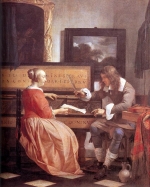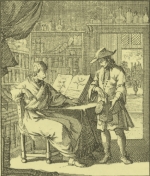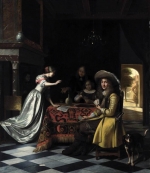About this web
Why this web
When I began researching the life and accomplishments of Antony van Leeuwenhoek, I was struck by:
- the small amount of readily available information in English
- the amount of contradictory information, especially about his life
Why wasn't there more information about this fascinating, important man? What are the correct facts about his life and accomplishments? This web site tries to respond to both questions with:
- correct information
- attractive, accessible information
The question that drove the research:
What do you do when you see things no one has ever seen before?
Wat doe je als je dingen ziet dat niemand ooit heeft gezien?
Any questions? Suggestions?
My name is Douglas Anderson. I am professor of English and Digital Literacies in the Interdisciplinary Studies Department at Medaille College in Buffalo, New York, U.S., and, since 2016, guest researcher at the Huygens Instituut voor Nederlands Geschiedenis (Huygens Institute for Netherlands History) in Amsterdam. I teach all of my courses online, so I can live in the Netherlands. Eventually, I will retire from teaching, but I will never retire from this fascinating research project.
I am interested in your feedback. Please use the email address on the contact page.
Acknowledgements
The historians at the Huygens Instituut are moving aggressively into the digital humanities, as am I. I am grateful to Charles van den Heuvel and especially Huib Zuidervaart. They have made me feel welcome and they are very patient with my still-developing Dutch speaking skills.
Some of the archival research for this web was done by Delft architect Johan Geertzenwijk, who also transcribes difficult-to-read handwritten documents, and microphotographer Wim van Egmond.
![]()
Many other people continue to be of assistance while I research the life of Leeuwenhoek. The archivists and librarians in Delft and Den Haag are very helpful. The following people have given many hours to help me learn the language and the culture that let Leeuwenhoek flourish. In alphabetical order and with a hartelijke dank to all of them!
|
|
Technical support: Egor Elkin, Drupal guru (photo on right). Email Egor if you need help with your Drupal installation!
The bulk of the archival research for this web was made possible through a Spring 2008 and Spring 2016 sabbatical grants and a Spring 2009 leave from Medaille College. In addition, since 2008, I spent every summer in the Netherlands working on this project. Finally, in 2017, thanks to the efforts of Medaille's vice-president for academic affairs Dr. Lori Quigley, I began teaching all of my courses online. Now living in Leiden full-time, I have an hour's bike ride to Leeuwenhoek's home in Delft and a short walk to the Boerhaave Museum, which houses the most comprehensive Leeuwenhoek collection.
Presentations and publications
Early on in my research, I gave a talk in the History of Medicine lecture series at the University of Amsterdam's Academisch Medisch Centrum at the invitation of its librarian, Lieuwe Kool. The positive reception gave me confidence that this buitenlander, foreigner, could tell today's Dutch people something interesting about their countryman Leeuwenhoek.
I posted a video "Lens on Leeuwenhoek" to YouTube in 2010.
2014
My article "Still going strong: Leeuwenhoek at eighty" was published on March 30, 2014, in the British microbiology journal Antonie van Leeuwenhoek, volume 106, issue 1, pp 3-26.
In April 2014, I gave a presentation, “Leeuwenhoek: The Myth, The Man”, at the annual Scientific Spring Meeting of the Royal Dutch Society for Microbiology and the Dutch Association of Medical Microbiology. I also presented at the 2023 annual meeting (see below).
On September 10, 2014, a video for which I did some of the voice-overs was featured in the Opinion section of the New York Times online. As “Animated Life: Seeing the Invisible” (screenshot on right; click to enlarge), it is still available on the Times’ web. It was also carried in the Dutch press, the NRC Handelsblad: “Anthoni van Leeuwenhoek zag als eerste het onzichtbare.” In addition, the Times posted it to their Op-Docs YouTube channel, the producers posted it to their portfolio on Vimeo, and the Howard Hughes Medical Institute, the underwriters, posted it on their site. In total, it received over thirty thousand views by the end of that year.
2015
At the June 2015 conference of Gewina, the Society for the History of Science in the Netherlands, I gave the presentation "The Leeuwenhoek Microscope: A dead-end design".
In September 2015, Dr. Zuidervaart presented the findings in our instruments paper at a conference in Italy where I was listed as a copresenter even though I did not attend. In November, he presented our findings again at an awards ceremony in Haarlem.
• "Antony van Leeuwenhoek’s microscopes and other scientific instruments". Scientific Instrument Symposium, Turin, Italy, 7 - 11 September 2015.
• "Anthoni van Leeuwenhoek: Bouwstenen voor een nieuwe biografie?" (trans: Building blocks for a new biography?). Boerhaave book prize for scientific biographies awarded by Museum Boerhaave and the Royal Netherlands Society of Science, Haarlem, Netherlands, 28 October 2015.
2016
With Dr. Huib Zuidervaart, I wrote "Antony van Leeuwenhoek’s microscopes and other scientific instruments: new information, partially from the Delft Archives". It was published in Annals of Science in Spring 2016. The "new information" that I found in the Delft notary archives is the list of Leeuwenhoek's scientific instruments in the inventory of his daughter's estate, a find that Dr. Zuidervaart termed "stunning".
In May 2016, Gewina's journal, Studium, published "The tensions between facts and fantasy," my essay review of Laura Snyder's Eye of the Beholder: Johannes Vermeer, Antoni van Leeuwenhoek, and the Reinvention of Seeing.
In June 2016, Dr. Zuidervaart and I were appointed editors of Alle de Brieven / Collected Letters. We succeeded Lodewijk Palm, who retired with volume 17 almost ready for press. With the help of intern Lizzy Entjes, we completed that task in late 2017.
2017
In May 2017, Studium published "Some comments on Jorink’s ‘Swammerdam, hoveling?'", my reaction to an earlier article, published in Studium, devoted to the reputation of the 17th-century microscopist Johannes Swammerdam (1637-1680).
At the June 2017 conference of Gewina, the Society for the History of Science in the Netherlands, Lizzy Entjes and I made a presentation "Last Call for Leeuwenhoek" about our plans to finish Alle de Brieven / Collected Letters. We reviewed the history of the series and put out a call for any Leeuwenhoek-related material.
2018
In March, I made a presentation at a workshop, Scientist Biographies: The differences between biographies in print and biographies on the web” at The Challenge of Digital Humanities for Scientist Biographies, Technische Universiteit Delft
In June, CRC Press, an imprint of Taylor and Francis, published volume 17 of Alle de Brieven / Collected Letters, which I co-edited along with Huib Zuidervaart. Volumes 18, 19, and 20 will be published in 2023.
2019
Lens on Leeuwenhoek was a candidate for the 2019 Geschiedenis Online Prijs (History Online Prize), which celebrates the best Dutch-related historical online presentations.
At the June 2019 conference of Gewina, the Society for the History of Science in the Netherlands, I made a presentation “Leeuwenhoek’s Lab”.
2020
In September, I made an online presentation, “The case of Sijmon Bourbon,” at a Huygens ING Webinar.
2021
In June, I made an online presentation, “Alle de Brieven / Collected Letters of Antoni van Leeuwenhoek” at the World Microbe Forum.
2022
On February 23, the article based on the World Microbe Forum presentation was published in FEMS Microbiology Letters: "'Your most humble servant’: the letters of Antony van Leeuwenhoek".
I spoke about Leeuwenhoek in À Delft, une fenêtre sur un autre monde (In Delft, a window on another world), an episode of Invitation au voyage on the French/German TV channel Arte. It was broadcast on March 4, dubbed in French and German.
At the June 2022 conference of Gewina, the Society for the History of Science in the Netherlands, I made a presentation, “The Case of Sijmon Bourbon: How Leeuwenhoek learned to build trust”.
2023
On April 5, I made a presentation, "Leeuwenhoek's Comptoire", at the annual Scientific Spring Meeting of the Royal Dutch Society for Microbiology and the Dutch Association of Medical Microbiology. I also presented at the 2014 annual meeting (see above).
Digital Humanities
Since 2015, I have been asked half a dozen times to make presentations about my work on Lens on Leeuwenhoek, the web, as opposed to my work on Leeuwenhoek, the man. I tailor the pages below for the audience and purpose. The dates indicate their first use, not their subsequent editing for a later presentation.
January 2016: Leeuwenhoek's Cabinet of Wonders: Project Description
April 2017: Digital Humanities Research
March 2018: The Challenge of Digital Humanities for Scientist Biographies
If you are interested in having me speak about the digital humanities, especially its practical applications, please contact me.
Copies of slide sets and articles mentioned above are available on request. See links below under Sources and Learn more.
Copyright
Lens on Leeuwenhoek is © 2009-2023 by Douglas Anderson under a Creative Commons License.
 This license says that if you use material you find here that isn't under copyright elsewhere:
This license says that if you use material you find here that isn't under copyright elsewhere:
- give me credit
- don't charge money for it without talking to me first
- share with others as I am sharing with you
Lens on Leeuwenhoek is as open as possible, yet respectful of other people's rights, so that the content remains freely accessible to all persons in perpetuity. Copying, modifying, and distributing for your own use are welcomed and encouraged.
A note on copyright
Copyrighting something like Lens on Leeuwenhoek, which is essentially a bit stream, is not as obvious as it may appear. Read Eben Moglen's Anarchism Triumphant: Free Software and the Death of Copyright in the August 1999 issue of First Monday. For more background, try Moglen's 2007 Framing the Debate: Free Expression versus Intellectual Property, the Next Fifty Years and some of the articles at the Free Software Foundation.
Lens on Leeuwenhoek is not sponsored by or affiliated with any owners of the specific trademarks used here, including those in hyperlinks. I have made a good faith effort to comply with the "fair use" clause of U.S. copyright law. Any copyrighted material on Lens on Leeuwenhoek is credited, usually linked, and used in limited amounts for not-for-profit educational purposes.
If you hold the copyright or trademark to any material on Lens on Leeuwenhoek and feel as though my use does not conform to the fair use provisions, notify me via the contact page and I will remove the material immediately until we resolve the issue.
 |
 |
 |
Colophon
To make this web, I used the Drupal 7 framework to tailor a CMS (content management system) for my purposes. For image editing, Pixlr.com. For the videos, Apple's Final Cut Pro. To learn more about traffic to the web, I use Google Analytics.
The database with the page code, scripts, style sheets, videos, and image files sit on a server owned by A2 Hosting, headquartered in Ann Arbor, Michigan, US. Their LAMP stack (mid-2018):
 |
 |
 |
 |
| Linux | Apache 2.2 | MySQL 5.6 | PHP 7.2 |
















